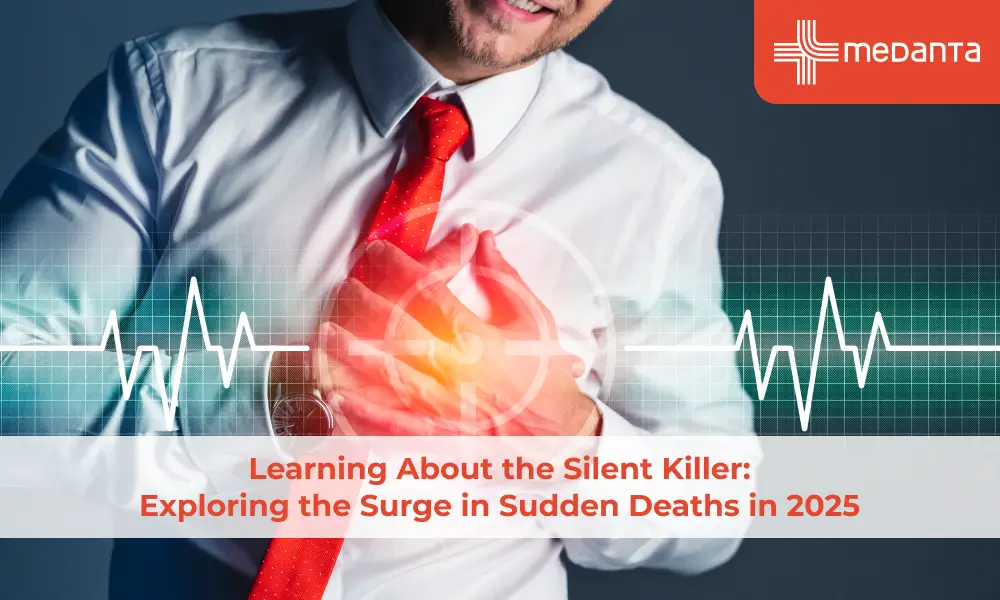Learning About the Silent Killer: Exploring the Surge in Sudden Deaths in 2025

TABLE OF CONTENTS
In a startling revelation, the National Crime Records Bureau (NCRB) has reported a 12% increase in sudden deaths in 2022, with the majority attributed to heart attacks. This alarming surge raises significant concerns about public health and prompts a closer look at the factors contributing to this rise. In this blog, we’ll talk about the NCRB findings, analyse potential causes, and explore preventive measures to address this concerning trend.
Understanding the Numbers
The NCRB's latest report paints a grim picture, indicating a 12% spike in sudden deaths compared to the previous year. To understand the gravity of the situation, it is crucial to examine the data in detail, including demographic patterns, regional variations, and any identifiable trends.
The Dominance of Heart Attacks
Among the myriad causes of sudden deaths, heart attacks emerge as the primary culprit. Unravelling the reasons behind this dominance requires an exploration of lifestyle factors, stressors, and underlying health conditions that may contribute to the increased vulnerability of individuals to cardiovascular events.
Lifestyle Choices and Their Impact
Dietary Habits and Their Connection to Heart Health
Our eating habits profoundly affect heart health. A well-rounded diet must include:
Plenty of fruits
Veggies
Whole grains
These foods offers vital nutrients for cardiovascular well-being. Conversely, too much saturated fat, salt, and sugar can lead to heart problems.
Being mindful of food choices is vital, favoring options that benefit the heart. Including omega-3 fatty acids from fish, flaxseeds, and walnuts helps lower cholesterol. Also, cutting down on processed and fried foods significantly promotes heart health.
The Role of Physical Activity
Exercise safeguards the heart. It sustains ideal weight, diminishes blood pressure, and betters cardiovascular performance. Activities like walking, running, or cycling enhance heart fitness.
Contrarily, a sedentary life harms the heart. Long sitting escalates heart disease risk. Small changes, like brief stretch breaks or choosing stairs over elevators, foster an active, heart-friendly life
Mental Health and Stress
Understanding the Link Between Mental Well-being and Heart Health
The mind and heart have a complex link. Mental health significantly affects heart well-being, with stress playing a crucial role. Chronic stress can trigger hormone release leading to inflammation and factors tied to heart disease.
Coping Mechanisms for Stress Reduction
Dealing with stress is vital for heart health. Integrate stress-relieving habits like mindfulness meditation, yoga, or deep-breathing exercises into daily life to manage stress. Building strong social connections and seeking support during tough times contributes to mental and heart well-being.
The Importance of a Holistic Approach to Health
Recognizing the interdependence of mental and physical health underscores the importance of a holistic approach to well-being. Practices like mindfulness and meditation not only reduce stress but also positively impact heart health. The mind-body connection emphasises that caring for our mental health is an integral part of nurturing our hearts.
Accessibility to Healthcare
Disparities in Access to Heart Health Resources
Universal recognition of healthcare importance exists, yet resource access disparities endure. Socioeconomic elements like income and education pose barriers. Geographic differences further restrict healthcare service availability in specific areas.
Strategies for Improving Access to Heart Health Information and Services
Addressing these disparities requires a multifaceted approach. Community outreach and education programs can empower individuals with the knowledge and resources needed to prioritise their heart health. Furthermore, the integration of telehealth solutions can bridge the gap for those in remote areas, providing access to medical advice and monitoring.
The Role of Early Detection
Importance of Regular Health Check-ups
Regular health check-ups serve as a crucial component of preventive care. Routine screenings for blood pressure, cholesterol levels, and other cardiovascular risk factors enable early detection of potential issues. Early intervention can significantly improve outcomes and prevent the progression of heart disease.
Technological Advancements in Early Diagnosis
Advancements in medical technology have revolutionised the landscape of early diagnosis. Innovations such as wearable devices offer continuous monitoring of vital signs, providing real-time data that can be instrumental in detecting changes in heart health. These technologies empower individuals to take a proactive approach to their well-being.
Advocacy for Heart Health
Individual Responsibility and Advocacy
Promoting heart-healthy behaviours is not only an individual responsibility but also a collective effort. Encouraging healthy habits within communities can create a ripple effect, fostering a culture of well-being. Simple lifestyle changes, when embraced collectively, can have a significant impact on the prevalence of heart-related issues.
Support for Heart Health Policies
Government initiatives and the work of non-profit organisations play a pivotal role in advocating for heart health. Policies that prioritise preventive care, education, and access to healthcare can contribute to a healthier population. Supporting these initiatives and being vocal advocates for heart health reinforces the importance of this cause on a broader scale.
Conclusion
Nurturing heart health requires a holistic approach that encompasses lifestyle choices, mental well-being, access to healthcare, early detection, and advocacy. By understanding the intricate web of factors that influence cardiovascular health, we can take proactive steps toward a heart-healthy life. As individuals and as a society, the collective effort to prioritise heart health will undoubtedly pave the way for a future where heart-related issues are minimised, and well-being thrives. It's time to embrace the journey toward a heart-healthy lifestyle—one choice at a time.
If you think you might be at risk of heart diseases, visit your nearest super-speciality hospital immediately!






